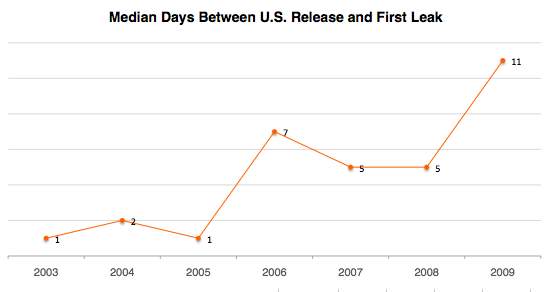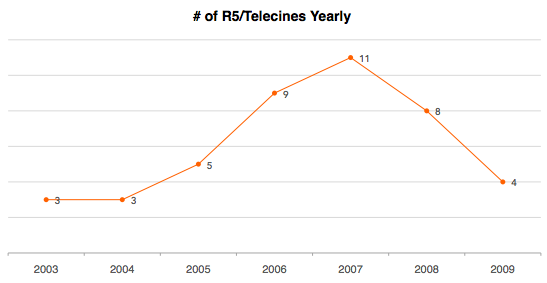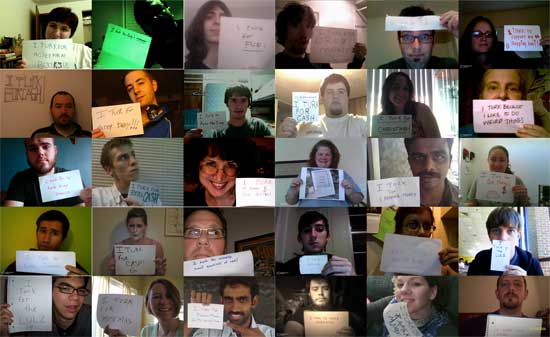 The Oscar nominees were announced this morning, which means it’s time to get out your scorecards to see who’s winning in the eternal struggle between the MPAA vs. the Internet. (Hint: It’s not the MPAA.)
The Oscar nominees were announced this morning, which means it’s time to get out your scorecards to see who’s winning in the eternal struggle between the MPAA vs. the Internet. (Hint: It’s not the MPAA.)
I’ve been tracking the distribution of Oscar-nominated films every year, culminating with the release of six years of piracy data last year. I’ve updated those spreadsheets with this year’s 26 nominees, for a total of 211 films from the last seven years.
You can view or download all the data below, including a second sheet with some interesting aggregate stats. As always, I’ll keep it updated until the Oscar broadcast.
View full-size on Google Spreadsheets.
Download: Excel (with formulas) or CSV
Findings
So, how did they do? Out of 26 nominated films, an incredible 23 films are already available in DVD quality on nomination day, ripped either from the screeners or the retail DVDs. (All 26 were available by February 7.) This is the highest percentage since I started tracking.
Only three films are unavailable — Rachel Getting Married wasn’t leaked online in any form, while Changeling is only available as a low-quality telecine transfer and Australia as a terrible quality camcorder recording. (Update: A DVD screener of Australia was leaked on January 23, a retail DVD rip of Changeling on January 31, and finally, the retail DVD of Rachel Getting Married on February 7.)
Other findings:
- Academy members received screeners for at least 20 of the 26 films.
- 25 out of 26 films leaked in some form online, if you include camcorder recordings.
- The average time from the time screeners are received by Academy members to its leak online is 6 days.
Surprisingly, it seems like this year’s Oscar movies took longer to leak online than in previous years. If I had to guess, it’s because far fewer camcorder copies were released for this year’s nominees. This could be because of the theaters cracking down on camcorder recordings, but I suspect it’s because fewer nominees were desirable targets this year for cams. (Aside from the obvious blockbusters, like Dark Knight, Kung Fu Panda, and Tropic Thunder.) The chart below shows the median number of days from a movie’s US release date to its first leak online.

Last year, one of the interesting findings was how the release of Region 5 DVDs were reducing the prestige of official screener leaks. This year, only four of the nominated films were released as R5s, compared to eight from last year. The numbers are still too small to tell if this is a trend, but it seems like the popularity of the R5 may have peaked in 2007. (Are the studios releasing fewer R5s in general?)

What other trends in the data am I missing? Feel free to chime in with your conclusions or visualizations in the comments.
Methodology
As usual, I included the feature films in every category except documentary and foreign films. I used Yahoo! Movies for US release dates, always using the first available date, even if it was a limited release. Cam, telesync, R5, and screener leak dates were almost universally taken from VCD Quality. I used the first leak date, with the exception of unviewable or incomplete nuked releases. Finally, the official screener dates came from Academy member Ken Rudolph, who lists the date he receives every screener on his personal homepage. Thanks again, Ken!
For previous years, see 2004, 2005, 2007, 2008 (part 1 and part 2).
Update: The screener for Australia was released today, so I added that date to the spreadsheet, along with some missing retail DVD dates from last year’s Oscars.
February 3, 2009: Some related links of interest… I was interviewed for Future Tense on American Public Media, talking about this entry. Bruce Lidl looked at leaks in the Foreign and Documentary categories, as well as how quickly HD-quality leaks are happening. Finally, Flowing Data is sponsoring a contest to generate information visualizations from this data.




